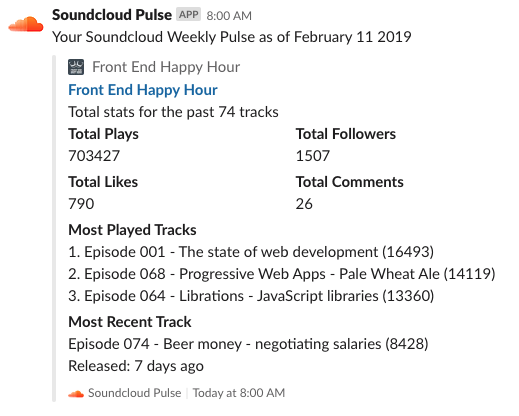https://github.com/augbog/slack-soundcloud-pulse
A Slack App that will crawl a specific Soundcloud User and post stats of how their tracks are doing into a channel.
https://github.com/augbog/slack-soundcloud-pulse
slack slackapi slackbot soundcloud soundcloud-api
Last synced: 4 months ago
JSON representation
A Slack App that will crawl a specific Soundcloud User and post stats of how their tracks are doing into a channel.
- Host: GitHub
- URL: https://github.com/augbog/slack-soundcloud-pulse
- Owner: augbog
- License: mit
- Created: 2017-03-20T08:41:09.000Z (over 8 years ago)
- Default Branch: master
- Last Pushed: 2019-04-01T16:31:47.000Z (over 6 years ago)
- Last Synced: 2025-04-04T05:42:07.574Z (8 months ago)
- Topics: slack, slackapi, slackbot, soundcloud, soundcloud-api
- Language: JavaScript
- Size: 288 KB
- Stars: 3
- Watchers: 1
- Forks: 0
- Open Issues: 4
-
Metadata Files:
- Readme: README.md
- License: LICENSE
Awesome Lists containing this project
README
# Soundcloud Pulse
A Slack App that will crawl a specific Soundcloud User and post stats of how their tracks are doing into a channel.

## Set up
1. Create `config.json` in `config/` and supply these values. You can also duplicate and create a `config.test.json` if you wish to test into a different webhook.
```
{
"SOUNDCLOUD_USER_ID": "",
"CLIENT_ID": "",
"APP_VERSION": "",
"SLACK_WEBHOOK_URL": ""
}
```
2. If you need help obtaining these values, go into the Network tab when you visit your Soundcloud profile and you should be able to find a request that makes such a call (filter by `api-v2.soundcloud.com`). These calls will have the parameters `client_id` and `app_version` passed. See the image below

3. Set up your Webhook URL in your Slack team. You can do this by going to [Your Apps](https://api.slack.com/apps), creating a new App, and then adding a new Incoming Webhook.
4. Run `npm install` in this repository.
5. Assuming you have done all the steps above, run `npm run start` and you should send a Slack message to the channel you chose when setting up your Webhook URL above.
6. If you wish to have this run on a weekly or monthly basis, you can set up a cron job and have it run the command. My crontab file looks like below and you can access via `sudo crontab -e` and will run Monday 8 AM every week
```
NODE_PATH=/home/pi/.npm/lib/node_modules
PATH=/usr/local/sbin:/usr/local/bin:/usr/sbin:/usr/bin:/sbin:/bin
0 8 * * 1 /usr/local/bin/npm start --prefix /home/pi/slack-soundcloud-pulse >/dev/null 2>&1
```
## Troubleshooting and other Notes
* The `client_id` value gets refreshed every so often so you may need to verify you have the right `client_id`. I have not pinpointed how often this refresh happens but it seems every few months it can refresh.
* Make sure you specify `NODE_PATH` and `PATH` in your crontab in order for it to run. See [here](https://stackoverflow.com/a/27823675/1168661)
* If you need to verify your cron job is working, you can do a `grep CRON /var/log/syslog` and see if your job is running.
* Sometimes it's nice to be able to test and send Slack attachment results to a test Slack channel. I have created an issue to do this see issue #4.
## Helpful links
* [Soundcloud API guide](https://developers.soundcloud.com/docs/api/reference)
* [Slack Attachment Message Builder](https://api.slack.com/docs/messages/builder)
* [Crontab Generator](https://crontab-generator.org/)